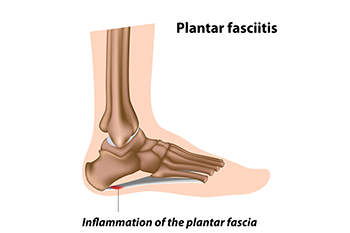
Plantar fasciitis, a common foot ailment affecting people between 25 and 65 years old, results from the overloading or overstretching of the plantar fascia, which is the supportive tissue beneath the foot's arch. A podiatrist may offer a variety of treatment options tailored to manage the pain of plantar fasciitis and help toward healing. Rest and support are integral to short-term management. Utilizing a walking boot and crutches allows the foot to rest, aiding in the recovery process. Corticosteroid injections become a consideration in cases of severe pain and inflammation resistant to other conservative treatments. However, caution is warranted due to potential weakening of the plantar fascia and the risk of rupture, which can lead to chronic pain and foot flattening. Extracorporeal shockwave therapy is a noninvasive procedure used by some podiatrists to stimulate healing in plantar fascia tissue. However, its effectiveness varies among individuals. Low-level laser therapy is sometimes employed by podiatrists to reduce the pain and inflammation associated with plantar fasciitis, offering relief for up to three months. In cases where nonsurgical treatments prove insufficient, foot surgery may be considered. But it typically is reserved for situations where significant improvement has not been observed through other methods. To find out more healing from plantar fasciitis, it is suggested that you schedule an appointment with a podiatrist for an exam and treatment plan.
Plantar fasciitis is a common foot condition that is often caused by a strain injury. If you are experiencing heel pain or symptoms of plantar fasciitis, contact Dr. Douglas Mckay from New Jersey . Our doctor can provide the care you need to keep you pain-free and on your feet.
What Is Plantar Fasciitis?
Plantar fasciitis is one of the most common causes of heel pain. The plantar fascia is a ligament that connects your heel to the front of your foot. When this ligament becomes inflamed, plantar fasciitis is the result. If you have plantar fasciitis you will have a stabbing pain that usually occurs with your first steps in the morning. As the day progresses and you walk around more, this pain will start to disappear, but it will return after long periods of standing or sitting.
What Causes Plantar Fasciitis?
- Excessive running
- Having high arches in your feet
- Other foot issues such as flat feet
- Pregnancy (due to the sudden weight gain)
- Being on your feet very often
There are some risk factors that may make you more likely to develop plantar fasciitis compared to others. The condition most commonly affects adults between the ages of 40 and 60. It also tends to affect people who are obese because the extra pounds result in extra stress being placed on the plantar fascia.
Prevention
- Take good care of your feet – Wear shoes that have good arch support and heel cushioning.
- Maintain a healthy weight
- If you are a runner, alternate running with other sports that won’t cause heel pain
There are a variety of treatment options available for plantar fasciitis along with the pain that accompanies it. Additionally, physical therapy is a very important component in the treatment process. It is important that you meet with your podiatrist to determine which treatment option is best for you.
If you have any questions, please feel free to contact one of our offices located in Caldwell, and Galloway, NJ . We offer the newest diagnostic and treatment technologies for all your foot care needs.

